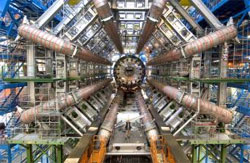
Scientists are preparing to view the beginnings of the universe and study some of the most complicated questions of physics with the powering up of the largest particle accelerator ever built.
The Large Hadron Collider (LHC) is 12 stories high and cost £5b. It is buried more than 300ft under the Alpine foothills in a 17mile tunnel along the Swiss-French border.
When the giant machine gets going, the LHC will blast protons - one of the building blocks of atoms - at a velocity just shy of the speed of light, generating temperatures of more than a trillion degrees centigrade.
Each proton beam will pack as much energy as a Eurostar train travelling at 150 kilometres per hour.
In layman's terms, the LHC will take protons and smash them together at high speeds.
The resulting collisions will hopefully replicate conditions found in the moments following the Big Bang - or the beginning of the universe - and scientists will study the fallout.
And why would they want to do this, you may ask?
Scientists want to explore answers to such questions as: Why does the universe look the way it does? Does another dimension, or dimensions, exist? How do particles acquire mass and therefore, gravity?
Particle physicist Dr Brian Cox, from the University of Manchester will be one of the scientists eagerly studying the results.
"The Large Hadron Collider is the biggest scientific project since the Apollo astronauts went to the moon, and that's no exaggeration," he said.
"It is the most complex machine ever built, and it's going to take us to a place we've never been before.
"The whole thing is incredibly exciting and incredibly difficult."
But turning the LHC on is no small feat.
Atoms are made up of a nucleus, or centre, made up of protons and neutrons. Hovering around the nucleus in an orbit-like relationship are electrons.
So in the first steps, atoms of hydrogen will be ripped apart and its protons feed into a series of smaller accelerators to build up their speed.
The move from the final accelerator to the LHC has to be perfectly timed to ensure stability. Once completed, a second beam running in the opposite direction will be introduced and the energy level boosted.
The first particle collisions are expected to take place within a few weeks.
Source: Sky News
However sceptics fear it could cause the end of the world.
Some scientists went to the European Court for Human Rights to try to stop the collider being turned on. They fear it may create giant earthquakes,tsunamis or even possibly a giant black hole.
Professor Sir Chris Llewellyn Smith of Cern says: "The chance we produce a black hole is minuscule." Which is not all that reassuring. But he adds: "Even if we do, it can't swallow up the Earth." It would be too small, and disappear in moments. In any case, they will only send the hadrons in one direction this week. The collisions start in October. Until then, at least, we're not all doomed.
Claims that the end of the worlds is night were angrily refuted by Professor Brian Cox, who incidentally was a former star of pop group D:Ream; the ex-keyboard player said: "Anyone who thinks the Large Hadron Collider will destroy the world is a t***."
Nice to know that the future of the world is in such capable, and articulate, hands.
Things can only get better...
:scared:


